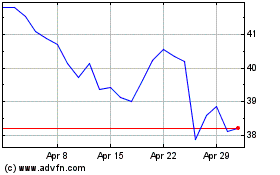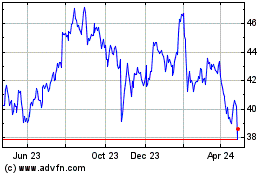By Drew FitzGerald
This article is being republished as part of our daily
reproduction of WSJ.com articles that also appeared in the U.S.
print edition of The Wall Street Journal (July 15, 2017).
AT&T Inc. plans to split the management of its telecom
operations and its media assets after clinching a takeover of Time
Warner Inc., putting veteran AT&T executive John Stankey in
charge of the Time Warner business, according to people familiar
with the matter.
The reorganization would create two divisions. One would contain
AT&T's wireless business and its DirecTV satellite television
business, the other would comprise the Time Warner assets it plans
to acquire, including HBO, Warner Bros. and the Turner cable unit
that houses CNN, the people said. AT&T last year said it would
take control of the entertainment company in a cash-and-stock deal
worth about $85 billion.
The new structure would keep AT&T Chairman and Chief
Executive Randall Stephenson atop the company with two top
lieutenants, in an organization that would resemble Comcast Corp.
Brian Roberts, Comcast's chairman and chief executive, has two
segment chiefs: one in charge of the cable business and the other
heading NBCUniversal.
The Justice Department is conducting an antitrust review of the
transaction, although President Donald Trump's pick for antitrust
chief, White House deputy counsel Makan Delrahim, is awaiting
Senate confirmation. The Senate is locked in a broader political
showdown over nominations, and it isn't clear when Mr. Delrahim
might be confirmed.
Justice Department staffers have interviewed executives and
collected information from the companies and rivals in the
industry, but the process is in something of a holding pattern
until Mr. Delrahim is in place, according to a person familiar with
the matter.
Mr. Trump vowed to block the deal when he was still a candidate
but hasn't commented on it since taking office. The combination of
two distinct businesses -- video and the networks that distribute
it -- is considered unlikely to face an outright government
challenge. But authorities have imposed merger conditions on
similar tie-ups, including Comcast's takeover of NBCUniversal.
The administration's ongoing feud with Time Warner subsidiary
CNN adds another wrinkle to the process. White House officials have
tangled with several national media outlets, but Mr. Trump has
saved extra ire for the cable news network.
AT&T has said it would maintain CNN's independence
post-merger and has no plans to spin off the network. The company
still expects to complete the transaction later this year.
AT&T spokesman Larry Solomon said the company is still
developing its integration plans and hasn't completed the new
organizational chart.
Mr. Stankey, a 30-year AT&T veteran, is currently head of
AT&T's entertainment business, which includes DirecTV and has
offices near Los Angeles. He has previously served as the company's
strategy chief and held various executive roles in its traditional
telecom business.
He would sit atop the existing Time Warner business, but
AT&T has indicated it would like to retain some top executives
at Time Warner to take advantage of their expertise, according to a
person familiar with the matter. Time Warner CEO Jeffrey Bewkes has
said he will stay on for an interim period to help with the
transition.
Under the new structure, DirecTV would be combined with the
company's telecom operations, which are run out of AT&T's
Dallas headquarters and include both the wireless and landline
business, the people familiar with the matter said. That segment
would be run by John Donovan, another AT&T veteran who is
currently chief strategy officer, one of the people said.
News of planned executive changes were earlier reported by
Bloomberg News.
AT&T has hinted it will be more than just a passive owner of
Time Warner's news and entertainment assets. Mr. Stephenson in May
floated some ideas for the combination that included shorter,
smartphone-friendly HBO videos and specially targeted
advertising.
How Time Warner, as part of AT&T, might negotiate with the
carrier's competitors is another potential concern. Mr. Stephenson
addressed some of those fears in May by repeating his pledge to
keep its most popular content available to all distributors.
"You can't think about taking 'Game of Thrones' and you're only
going to make it available to AT&T customers," he said at the
time. "That's crazy."
AT&T has started toying with special entertainment offers
ahead of the deal's close. In April, it offered subscribers of its
premium unlimited data plans free access to HBO, which normally
costs $15 a month.
Aside from the Justice Department, several state attorneys
general are taking the routine step of reviewing the deal's
antitrust implications. The states' probe deals with how AT&T's
nearly 147 million wireless customers affect its bargaining
position with other media companies, among other questions,
according to a person familiar with the joint effort.
Government enforcers sometimes monitor a merged company to make
sure two newly combined businesses don't gain an unfair edge over
rivals.
"They could be anticipating that they're going to have to face
some stiff enforcement proposals and they're preparing themselves,"
said Gene Kimmelman, chief executive of Public Knowledge, an
interest group that opposes the deal.
Write to Drew FitzGerald at andrew.fitzgerald@wsj.com
(END) Dow Jones Newswires
July 15, 2017 02:47 ET (06:47 GMT)
Copyright (c) 2017 Dow Jones & Company, Inc.
Comcast (NASDAQ:CMCSA)
Historical Stock Chart
From Mar 2024 to Apr 2024

Comcast (NASDAQ:CMCSA)
Historical Stock Chart
From Apr 2023 to Apr 2024
